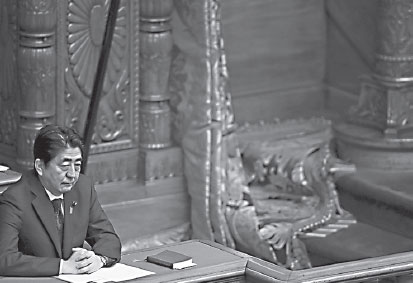Diet backs security bills as protests plague Abe
|
Japanese Prime Minister Shinzo Abe attends the upper house plenary Diet session in Tokyo on Friday after a censure motion against him was filed by an opposition party in their attempt to block contentious security bills that have sparked angry protests. Koji Sasahara / AP |
Japan's parliament enacted a major shift in defense policy on Saturday, which could allow Japanese troops to fight overseas for the first time since the nation's defeat at end of World War II 1945.
It was a milestone in Prime Minister Shinzo Abe's push to loosen the limits of the pacifist constitution on the military.
Abe claimed the shift, the biggest change in Japan's defense policy since the creation of its postwar military in 1954, is vital to meet new challenges.
The legislation has triggered massive protests from ordinary citizens and others who say it violates the constitution and could ensnare Japan in US-led conflicts after 70 years of postwar peace. Abe's ratings have also taken a hit.
The legislation "is necessary to protect the people's lives and peaceful way of living and is for the purpose of preventing wars," Abe told reporters after the bills were approved by the upper house. "I want to keep explaining the laws tenaciously and courteously."
The United States welcomed the changes, but China, where bitter memories of Japan's wartime aggression run deep, has repeatedly expressed concern.
China urged Japan to act prudently after the vote.
"We seriously urge Japan to learn lessons from history and listen to the just appeal of its people and the international community, and pay attention to the security concerns of its neighbors," said Chinese Foreign Ministry spokesman Hong Lei in a statement on Saturday.
Under the newly enacted legislation, Japan will create a law to allow its Self-Defense Forces to carry out logistical support missions for foreign militaries in international peacekeeping operations. Ten existing laws related to security will be revised.
"It marks an unprecedented move by Japan in the military and security fields after World War II," Hong said.
Japan recently beefed up its military forces and adjusted its military and security policies - moves that diverge from the path of peace, development and cooperation, and which also raise doubts in the international community about whether Japan will abandon its defensive policy and peaceful development, Hong said.
"For historical reasons, Japan's policies and moves in the military and security areas have been closely watched by its Asian neighbors and the international community," he said.
Hong called on Japan to stick to a path of peaceful development and act prudently in the military security field, and to do more things that help regional peace and stability, instead of the opposite.
Thousands of demonstrators have rallied near parliament every day this week, chanting "Scrap the war bills" and "Abe resign". Large crowds were still protesting into the early hours on Saturday.
The protests called to mind those that forced Abe's grandfather, Nobusuke Kishi, to resign 55 years ago after forcing a US-Japan security treaty through parliament.
The latest revisions expand the scope for Japanese logistical support for the militaries of other countries, and for participation in peacekeeping. The changes still leave Japan constrained in overseas military operations by legal limits, as well as by a deeply rooted anti-war public mindset.
"Even if the constitution is revised, among the Japanese people no one is thinking of going to foreign lands for the purpose of exercising force," former defense minister Itsunori Onodera said in an interview last week. "I think Japan will maintain that stance from now on."
Critics, however, say the changes make a mockery of the pacifist constitution and deplore what they see as Abe's highhanded mode of pushing for enactment of the bills.
Opposition to the legislation brought together both liberals keen to preserve Japan's pacifist principles and conservative critics of what they consider Abe's authoritarian tactics.
"The content, process and doctrine of the security bills ... risk reversing the path we have walked for the past 70 years as a country of peace and democracy," Yukio Edano, secretary-general of the opposition Democratic Party, told parliament's lower house earlier.



















